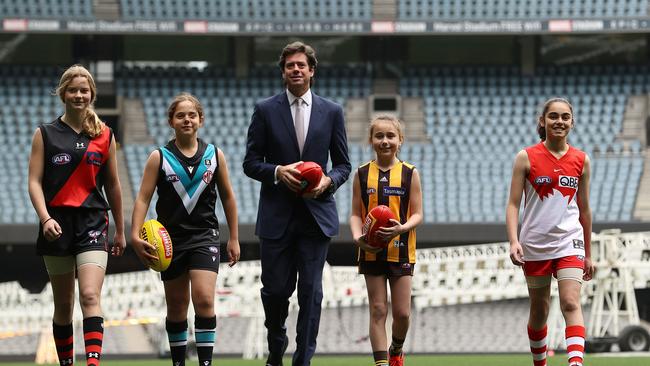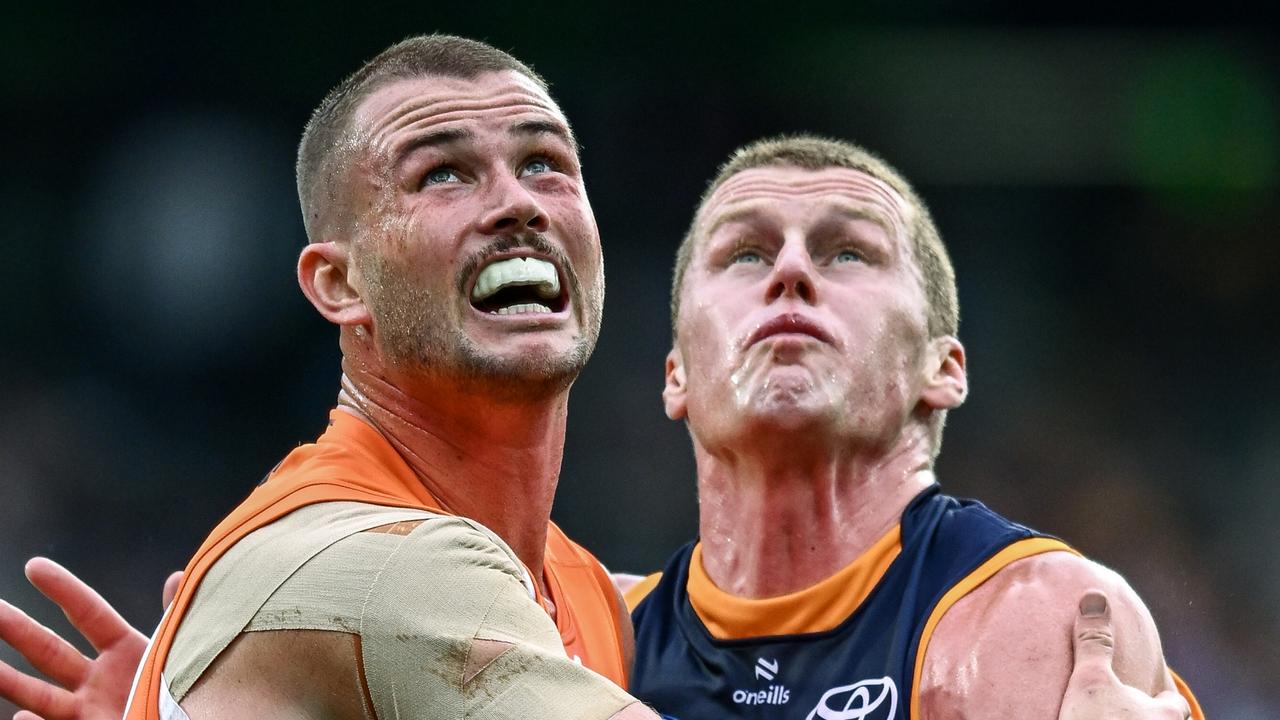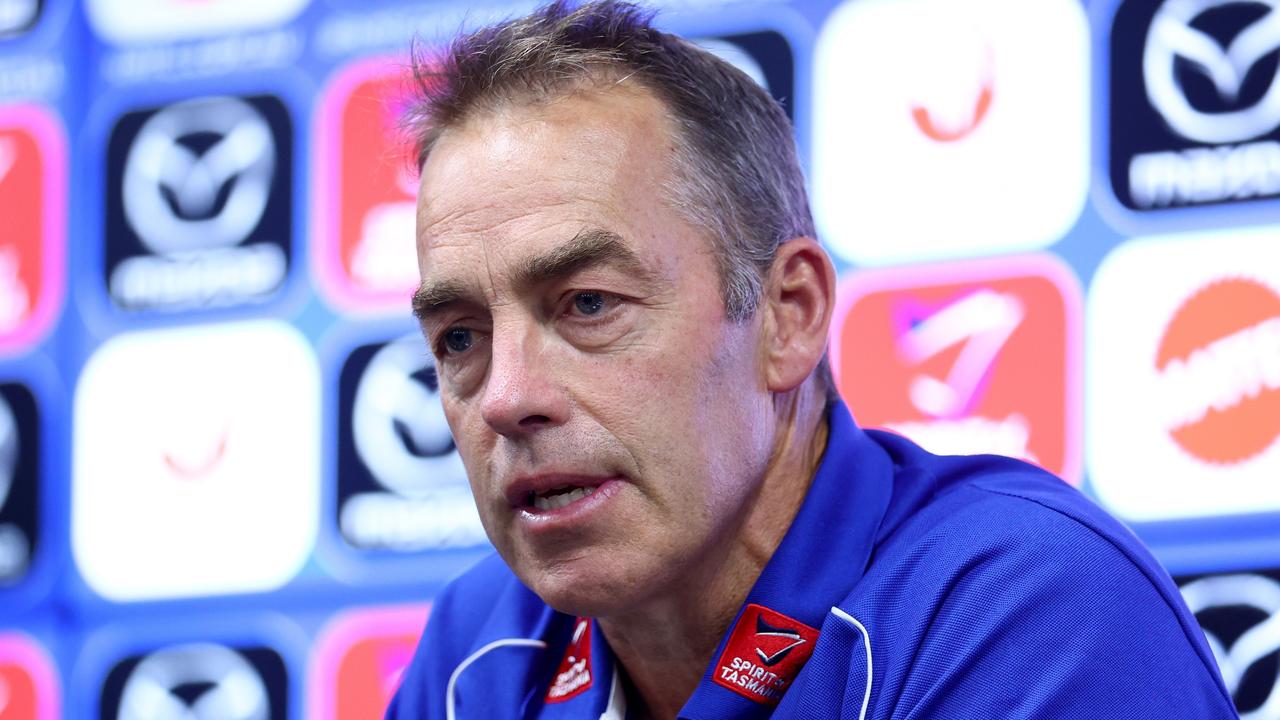A week of darkness and hope for the AFL
The AFL has unveiled a longer term view to a future of inclusion on several fronts as current champions continue to battle a rancid scourge pushed by a toxic minority

In a week of swirling emotions for the AFL, a scene at Princes Park on Thursday was both a harkback to its traditions and a glimpse of the future of footy. There is hope for the game.
On Royal Parade, journalists milled ahead of a board meeting at Carlton, waiting outside as the once all-conquering Blues convened to discuss a detailed review into the footy club.
Rediscovering a recipe for success that has deserted Carlton this century is their goal. Few clubs command more attention to their inner workings and on-field form, or lack thereof it.
There is a moment to celebrate in Marc Murphy’s 300th and final game this weekend, but despair surrounding co-captain Sam Docherty’s recurrence of testicular cancer. It is a testing time at Carlton.
But closer to Melbourne Cemetery, a couple of young girls booted a footy back and forth, oblivious to the drama on the other side of the inner-suburban park.
This simple joy took place just a few hours after it was announced the AFLW will expand to 18 clubs later this season, with every men’s team now fully rounded with a women’s side.
In a difficult week, where the ugly scourge of racism has cast a shadow over the competition, Thursday was a significant triumph for the AFL and for women’s football more broadly.
No matter the outcome at Carlton – be it that David Teague is given an opportunity to thrive with a healthy list or if a more experienced coach is recruited – the situation pales in significance.
In years to come those young girls, mucking around with a Sherrin in their hour of exercise during lockdown, might well represent Essendon or Hawthorn or Port Adelaide or Sydney and inspire others.
The AFLW has taken giant strides since its introduction in 2017. But there are still major steps that need to be taken in the coming years. Long term vision remains crucial.
Improvements in payment and conditions, along with more women in leadership roles, are among aspects to work on, which should then provide even greater opportunities.
A chance is something the proud football state of Tasmania has been desperate for.
The Apple Isle wants the opportunity to field their own club instead of providing champions for the mainland.
A review by AFL Commissioner Colin Carter released on Friday should be a pivotal moment in this battle and for the competition, even in the midst of a financial crisis caused by the pandemic.
Most recently Geelong’s long-term president, Carter is certain a 19th team would work with funding of about $15 million annually from the AFL and up to $11 million from Tasmania.
Other alternatives to consider are a joint-venture or the potential relocation of a current club.
But those options are clearly far less preferable for both Tasmania and for any side nominated from elsewhere. Forced mergers and relocations can rip the fabric from a football club and league.
Similarly to the AFLW and the expansion in the northern states, Carter argues a longer term lens is needed, despite current economic difficulties, when arguing for a stand-alone Tasmanian team.
“The numbers here work. Anyone who says they don’t work has a view of the way sport operates that doesn’t exist in the real world,” he told News Corp Australia.
An awful counterpoint to the optimism is the hurt inflicted, yet again, on champions of the sport over the past week, as explained so evocatively by Carlton’s champion Eddie Betts.
No matter how far football and society, more broadly, seems to have come, a slur from a leader like Taylor Walker, or from any anonymous coward, rips open the rawest of wounds.
An opportunity to learn from? It should not be needed. There have been countless clear episodes this year, let alone over the past decade and beyond, to Do Better. It must happen.
Just as every young girl kicking the footy can now dream of playing on the MCG, and Tasmanians are a step closer to barracking for their own team, those aspiring to follow the footsteps Eddie Betts should be able to do so free of the fear of discrimination, to be able to play for the love of the game.




To join the conversation, please log in. Don't have an account? Register
Join the conversation, you are commenting as Logout